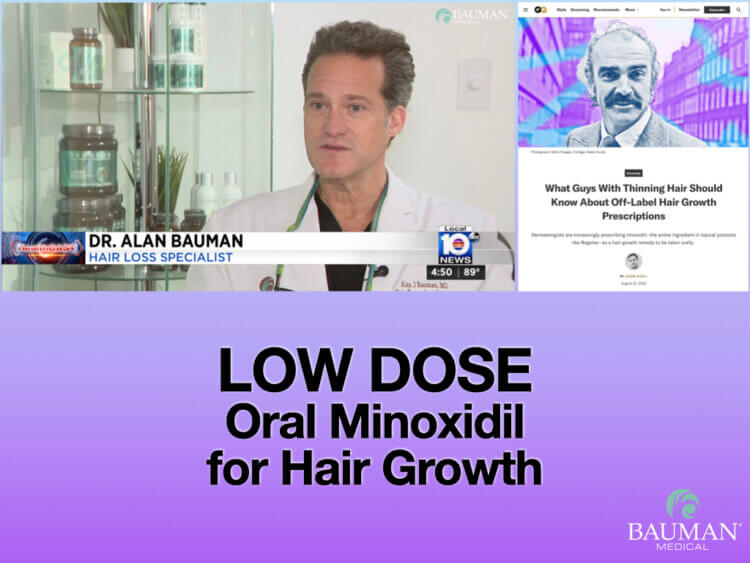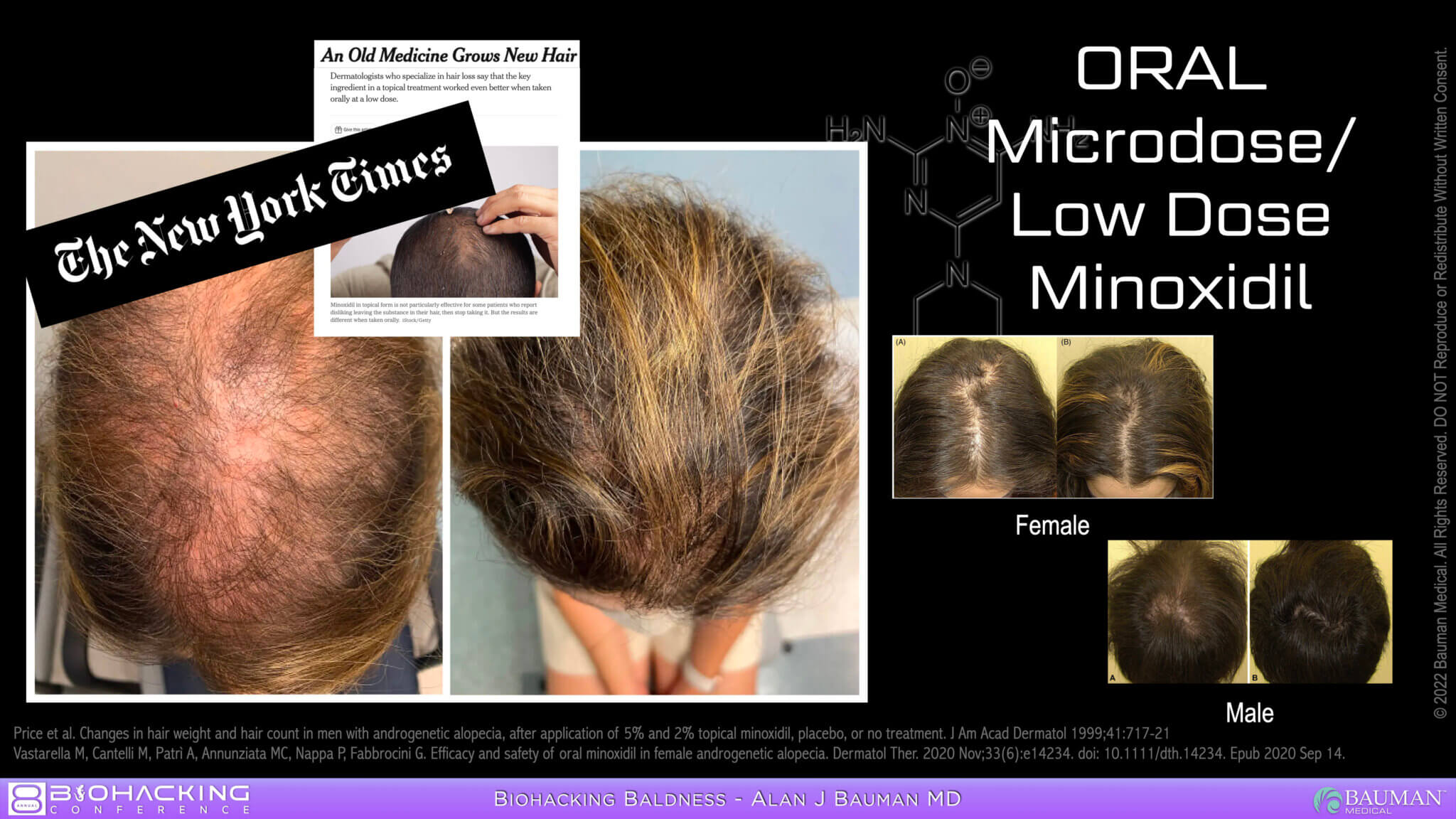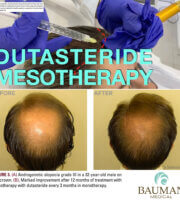
ABOVE VIDEO: Dr. Alan Bauman discusses Low Dose Oral Minoxidil for Hair Growth on Local10 WPLG Miami
“What’s old is what’s new” regarding oral minoxidil for hair growth. Can off-label low-dose minoxidil give your hair loss treatment regimen a must-needed boost? Find out how Dr. Bauman has used oral low-dose minoxidil for hair regrowth in his hair loss patients for years…
History of Minoxidil
In the 1970s, Minoxidil was first approved as an oral medication to treat hypertension, aka high blood pressure. Dosages typically ranging from 10mg to 40mg daily were used to control severe and treatment-resistant high blood pressure. At these dosages, patients were often observed to have a peculiar side effect: hypertrichosis! (Excessive hair growth on the face and body.) Soon after, based on these intriguing observations, a topical version of minoxidil under the brand name Rogaine became the first FDA-approved hair growth treatment. This approval was based on research that confirmed that the drug was effective in male pattern hair loss and later in female pattern hair loss. Topical minoxidil is considered a first-line therapy for hair loss.
Minoxidil is available today in a variety of formats, including name-brand Rogaine and generic topicals (2% and 5% solutions and foam versions available over-the-counter) and prescription versions such as off-label compounded pharmaceutical topicals (like Formula 82M and 82F Topical Finasteride), generic oral tablets, as well as off-label quality-compounded low dose oral versions.
Recently, interest has significantly increased regarding low-dose minoxidil after news articles appeared in NY Times entitled “An Old Medicine Grows New Hair…” and in GQ, “What Guys With Thinning Hair Should Know About Off-Label Hair Growth Prescriptions,” as well as on local and national broadcast TV news, such as WPLG Local 10 Miami.
Many years ago, reports of off-label low-dose minoxidil for hair regrowth were shared amongst Hair Restoration Physicians–doctors who specialize in the treatment of hair loss–and later, peer-reviewed research articles began to appear in the clinical literature. Some of the small minority of doctors specializing in hair loss worldwide, like Dr Alan Bauman, have prescribed minoxidil orally off-label in “micro” or low-dose formats for many years.
[Side Note: Unfortunately, most traditional dermatologists are unaware of these types of advances and alternative treatments, are inexperienced in prescribing them, and also very, very rarely have the equipment or the motivation to actually measure results for their hair loss patients.]

What does “off-label” mean?
Doctors may prescribe “off-label” treatments to help improve efficacy and reduce the side effects of previously FDA-approved drugs. For example, the most commonly prescribed off-label treatment at Bauman Medical called Formula 82M is a carefully compounded mixture of minoxidil, tretinoin, fluocinolone, and other ingredients in a non-greasy, scalp-friendly topical hair growth solution. Formula 82M has been used in tens of thousands of prescriptions over two decades and can be compounded and prescribed in both the US and Canada. Formula 82M improves the effectiveness of traditional over-the-counter topical minoxidil (rogaine or generic minoxidil) and reduces the side effects by making it less greasy and less irritating.
How does minoxidil work?
Minoxidil is a potent vasodilator that increases blood circulation. At the level of the hair follicle, minoxidil increases hair growth by reducing the length of time hair follicles spend resting in Telogen (resting) and increasing the amount of time they spend in Anagen, the growing phase. The result is thicker, stronger, longer, and often, more pigmented hair fiber production. Hair follicles and the hair fibers they produce become thicker in length and diameter while under treatment with minoxidil.
What is Oral Minoxidil?
Originally available in a topical version (Rogaine), minoxidil has been prescribed orally off-label in a “micro” or low dose for hair growth. Doctors around the world, including Dr. Alan Bauman at Bauman Medical, have been prescribing and studying the effects of micro-dose / low-dose oral minoxidil on hair regrowth in men and women for many years. Recently, interest has significantly increased regarding low-dose minoxidil after articles appeared in NY Times entitled “An Old Medicine Grows New Hair…” and in GQ, “What Guys With Thinning Hair Should Know About Off-Label Hair Growth Prescriptions.”
Does minoxidil work orally?
Yes. Oral minoxidil has been proven in published studies to promote hair growth. It is one of two FDA-approved drugs for hair growth. Low-dose oral minoxidil has been a part of Dr. Bauman’s hair loss treatment plans for years.
Who is a good candidate for oral minoxidil treatment?
Oral minoxidil is indicated off-label for the treatment of Androgenetic Alopecia and/or Female Pattern Hair Loss. It is also indicated for the treatment of chronic telogen effluvium, traction alopecia, and post-chemotherapy-induced alopecia. It is an excellent treatment option for people who find it challenging to adhere to topical treatment for hair growth or who have scalp health concerns (e.g., irritation) or other limitations that prohibit them from using topical treatments consistently (e.g., those who find them too messy, those who shampoo their hair infrequently, etc.). There are reports that for some patients, oral minoxidil alone may be more effective than standard topical minoxidil alone.
If you feel you have reached a plateau on your hair growth regimen (you’re not improving) or you feel like hair loss is progressing, it’s time to schedule a hair loss consultation with Dr. Bauman or his team to review your hair loss status. Click here: https://www.baumanmedical.com/schedule-consultation
How do I get low-dose oral minoxidil for hair growth?
Because low-dose minoxidil is an off-label prescription medication, you will need a prescription from a doctor. Dr. Alan Bauman has years of experience in treating men and women with low-dose minoxidil and can help you track your progress. Start a hair loss consultation with Dr. Bauman here.
Can oral minoxidil work for me if topical minoxidil does not?
Yes! Many patients find it easier to take oral medications consistently than to apply topical medications.
How long does it take to see results with low-dose oral minoxidil?
Minoxidil can start to work immediately. However, similar to any non-invasive hair growth treatment, it always takes longer than you think to see the results! Because hair grows at a rate of ¼ to ½ inch per month, it typically takes a minimum of three two six months to measure improvements with HairCheck and six to twelve months to judge the full results of the treatment.
Do I Need to Stay on Oral Minoxidil Indefinitely?
Yes, in order to maintain the hair growth results, you must continue the medication.
Can oral minoxidil be used in conjunction with topical minoxidil or other therapies?
Yes, in fact, Dr. Bauman always recommends a multi-therapy approach to treating hair loss which includes reducing risk factors and improving lifestyle, as well as considering treatments such as laser therapy/photobiomodulation, regenerative therapies (PRP, PDO, exosomes, etc.), other oral medications as well as nutritional supplementation, proper scalp hygiene, and hair care, and transplantation for severe cases.
Should I stop topical minoxidil when starting oral minoxidil?
Patientsthe oral low-dose minoxidil
Will oral minoxidil work even though topical (rogaine) minoxidil did not?
There is some evidence to believe that oral minoxidil may provide better hair regrowth in some patients depending on several factors, which include: genetics, the type of topical minoxidil they used, their application method, and the frequency/consistency of use.
Do you have a specific question about oral minoxidil for hair growth? Ask it here: https://www.baumanmedical.com/ask
Who cannot take oral minoxidil?
People with heart disease, low blood pressure, congestive heart failure (CHF), kidney or liver disease, pheochromocytomas, porphyria, and women who are pregnant or nursing should not take oral minoxidil.
How should I take oral minoxidil?
The best results with oral minoxidil are produced by taking a low dosage of oral minoxidil once or twice daily. Dr. Bauman recommends “Start Low, Go Slow” to minimize the possibility of side effects. To find out the correct starting dose for you, Dr. Bauman recommends a comprehensive private one-on-one consultation. This can be done virtually or in the office by starting here: baumanmedical.com/schedule-consultation.
What kind of low dose minoxidil should I take?
Dr. Bauman suggests using a quality compounded low-dose minoxidil mixture that contains other synergistic ingredients.
Is oral minoxidil dangerous?
Minoxidil is a potent vasodilator and antihypertensive agent that, at standard doses, can have serious adverse side effects. The warnings on the official label include pericardial effusion progressing to tamponade, exacerbation of angina pectoris, and minoxidil has been known to cause adverse myocardial lesions and cardiac effects in animals. Dr. Bauman strongly recommends a detailed consultation and medical examination before starting any off-label hair growth treatment, especially low-dose oral minoxidil.
What are the potential side effects of oral minoxidil?
About 10% of women experience increased hair growth on the face or body. Spironolactone, a diuretic and anti-androgen medication, can be prescribed concurrently with minoxidil in women to reduce the risk of unwanted hair growth. If you do experience unwanted hair growth, it is generally easily managed in our office with laser hair removal or other methods of hair removal. Men should not take spironolactone orally.
More serious but rare side effects of oral minoxidil include dizziness, headaches, ankle swelling, increased heart rate, palpitations, or weight gain from fluid retention. If you experience any of these, discontinue oral minoxidil and notify our office immediately.
Will oral minoxidil lower my blood pressure?
It is possible. However, the doses used for hair growth are significantly smaller than the doses to treat blood pressure. Most patients will not experience decreased blood pressure (resulting in headaches or dizziness, etc.), and in fact, some studies support the concept that minoxidil will not have any effect on patients who have normal blood pressure.
Will some initial hair shedding occur when I start oral minoxidil?
It is possible to see increased shedding when adding or increasing oral minoxidil to your regimen. This usually occurs within a month and lasts for a few weeks.
What is the correct dose of oral minoxidil for me?
Your individualized, safest, and most effective oral minoxidil dose should be discussed with Dr. Bauman. Dr. Bauman generally prescribes a very low dose to start and increases slowly while monitoring you for side effects and also for improvement in your HairCheck measurements. Dr. Bauman typically does NOT prescribe generic minoxidil and prefers a custom compounded version that may include synergistic or beneficial ingredients depending on age, gender, weight, health status as well as hair loss diagnosis, the extent of hair loss, and other treatments.
What should I do before I start low-dose oral minoxidil?
The first step in any hair restoration treatment program should be a consultation with an experienced, credentialed, and ABHRS board-certified Hair Restoration Physician. An accurate diagnosis should be obtained. Hair loss status should be measured and tracked using both HairCheck and HairMetrix. First-line therapies should be tried. Low-dose minoxidil may be added depending on your hair loss status, adherence to treatment, and response to the therapies. If you feel you have reached a plateau on your hair growth regimen or you feel like hair loss is progressing, it’s time to schedule a hair loss consultation with Dr. Bauman or his team to review your hair loss status.
If you or someone you know has hair loss, hair thinning, baldness, or eyebrow / eyelash concerns, click to start either a long-distance virtual consultation OR an in-person, in-office consultation with Dr. Bauman. You can also Ask Dr. Bauman a Question or simply call Bauman Medical Group at +1-561-394-0024.
*Each individual's treatment and/or results may vary
REFERENCES
Lemes LR, Melo DF, de Oliveira DS, de La-Rocque M, Zompero C, Ramos PM. Topical and oral minoxidil for hair disorders in pediatric patients: What do we know so far? Dermatol Ther. 2020 Jul 2:e13950. doi: 10.1111/dth.13950. Epub ahead of print. PMID: 32614119.
Guinter Kahn, dermatologist who helped develop baldness remedy, dies at 80. Associated Press, September 26, 2014.
Randolph M, Tosti A. Oral minoxidil treatment for hair loss: A review of efficacy and safety. J Am Acad Dermatol. 2021 Mar;84(3):737-746. doi: 10.1016/j.jaad.2020.06.1009. Epub 2020 Jul 2. PMID: 32622136.
Sharma AN, Michelle L, Juhasz M, Muller Ramos P, Atanaskova Mesinkovska N. Low-dose oral minoxidil as treatment for non-scarring alopecia: a systematic review. Int J Dermatol. 2020 Aug;59(8):1013-1019. doi: 10.1111/ijd.14933. Epub 2020 Jun 9. PMID: 32516434.
Jimenez-Cauhe J, Saceda-Corralo D, Rodrigues-Barata R, Moreno-Arrones OM, Ortega-Quijano D, Fernandez-Nieto D, Jaen-Olasolo P, Vaño-Galvan S. Safety of low-dose oral minoxidil treatment for hair loss. A systematic review and pooled-analysis of individual patient data. Dermatol Ther. 2020 Aug 5:e14106. doi: 10.1111/dth.14106. Epub ahead of print. PMID: 32757405.
Jimenez-Cauhe J, Saceda-Corralo D, Rodrigues-Barata R, Hermosa-Gelbard A, Moreno-Arrones OM, Gil-Redondo R, Ortega-Quijano D, Fernandez-Nieto D, Jaen-Olasolo P, Vaño-Galvan S. Characterization and management of hypertrichosis induced by low-dose oral minoxidil in the treatment of hair loss. J Am Acad Dermatol. 2020 Sep 11:S0190-9622(20)32594-9. doi: 10.1016/j.jaad.2020.08.124. Epub ahead of print. PMID: 32926970.
Beach RA, McDonald KA, Barrett BM. Tolerated, Effective, Successful: Low Dose Oral Minoxidil for Treating Alopecia, A 3-Year North American Retrospective Case Series. J Am Acad Dermatol. 2020 Oct 21:S0190-9622(20)32844-9. doi: 10.1016/j.jaad.2020.10.032. Epub ahead of print. PMID: 33098962.
Beach RA. Case series of oral minoxidil for androgenetic and traction alopecia: Tolerability & the five C’s of oral therapy. Dermatol Ther. 2018 Nov;31(6):e12707. doi: 10.1111/dth.12707. Epub 2018 Sep 24. PMID: 30246901; PMCID: PMC6586015.
New York Times: Health 8/18/2022 “An Old Medicine Grows New Hair…”
www.nytimes.com/2022/08/18/health/minoxidil-hair-loss-pills.html
GQ Grooming 08/22/2022 “What Guys With Thinning Hair Should Know About Off-Label Hair Growth Prescriptions” https://www.gq.com/story/oral-minoxidil
WPLG Local 10 Miami – Kristi Krueger “Doctors use drug off label to treat hair loss” https://www.local10.com/health/2022/09/14/doctors-use-drug-off-label-to-treat-hair-loss/
Related Posts

What is Dutasteride Mesotherapy? - Telogen Effluvium, Hair Fall and Hair Shedding
- VIDEO: Biohackers Magazine Interview Podcast with Dr Alan Bauman Hair Loss Specialist
- VIDEO: What to do if you are just starting to lose your hair






































